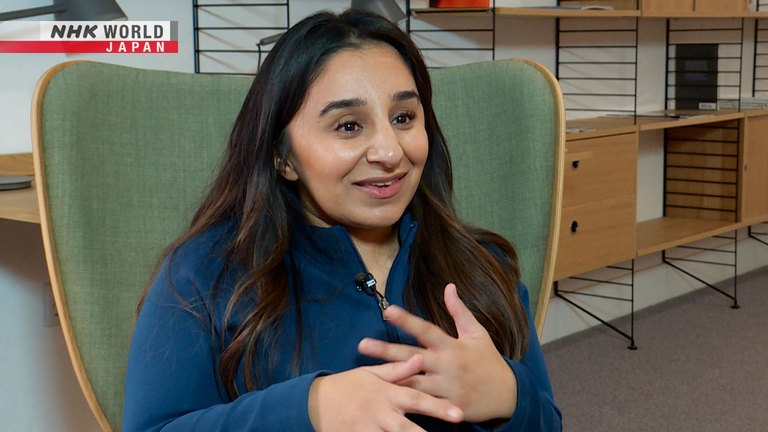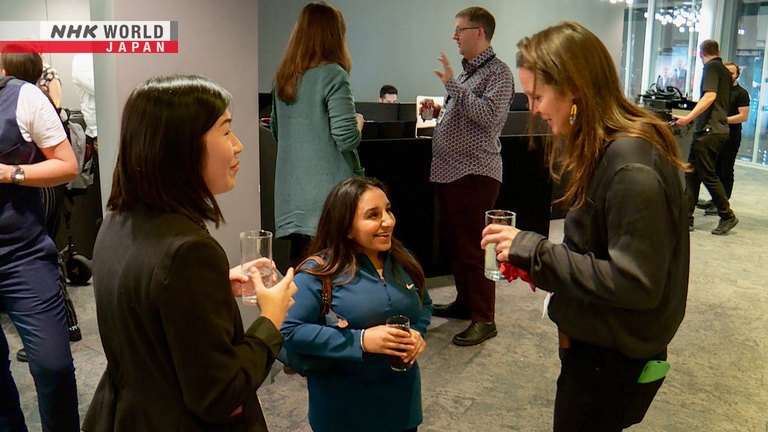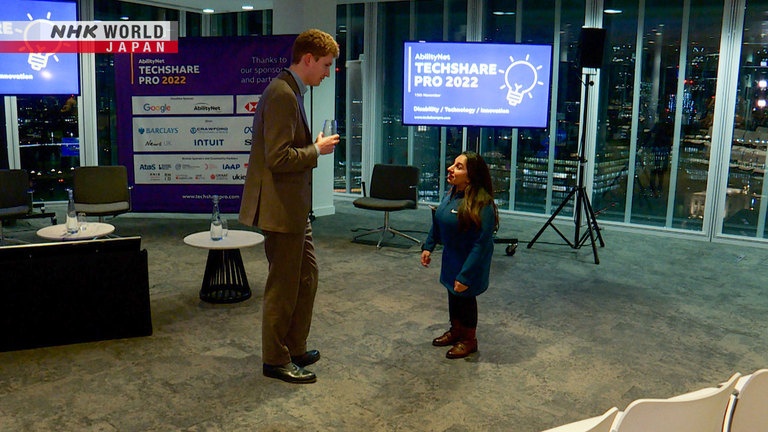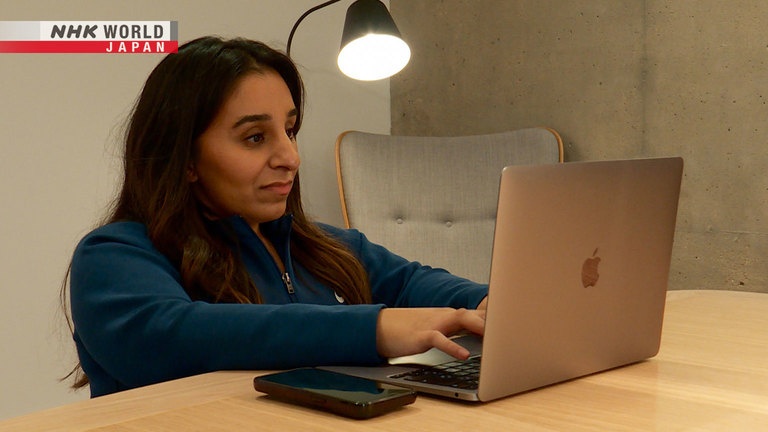Breaking Barriers for Accessible Society: Shani Dhanda / Disability Activist
Shani Dhanda is a British disability activist. She was born with brittle bone disease. The barriers she has faced motivates her to make the world inclusive for disabled people.




Transcript
Direct Talk
A panel discussion on
"Media Representation of Disability"
was held in London in November 2022.
Shani Dhanda today on Direct Talk
was its guest speaker.
She is a British disability activist,
Dhanda has been vocal on her efforts
to change the world
based on her own experiences.
Shani Dhanda
Disability Activist
Quite often when we see
disability representation
or disabled people in the news or media,
its disabled people talking about disability,
we need much more incidental representation.
We have to stop pigeonholing disabled people
to only talk about disability.
She held the first event in the UK
to support disabled people
and South Asian women in 2019.
She has appeared on many TV programs
to speak out for
the rights of people with disabilities.
Dhanda continues to break the barriers
to create an accessible society
where everyone can live better lives.
Breaking Barriers for Accessible Society
The society that I want to live in
is one that is accessible
both physically,
but also societally
attitudinally.
Because it is not my condition
or impairment that disables me.
It's the barriers and bias that I face.
Those are the things that disables me.
Dhanda has faced
many physical barriers over the years.
Moreover, she felt discrimination
by the people where she grew up.
I was born into a very big
South Asian Indian community,
one which I'm really proud to be part of.
I love my identity.
But disability still, even today,
faces a further sense of stigma.
So, it's still a very much taboo topic.
And actually, we don't really have
the language to talk about disability
and in our own cultures
and religions for example.
Dhanda is 116cm tall
due to a rare genetic condition.
She has suffered
many inconveniences and discomfort.
I live in London,
but the transport here,
the public transport system
is really not accessible.
Only 33% of the tube infrastructure,
which is the underground, is accessible.
The supermarket
I can't really reach many things.
ATM is sometimes are too high.
If I want to buy a sandwich,
it might be all the way on the top shelf.
Dhanda has taken change into her own hands
to improve media representation
and raises awareness of the environment
for people with disabilities.
There were times when she was criticized
for being over-exposed in the media,
but encouragement from other disabled people
gave her the strength
to continue taking on challenges.
Dhanda was born in Birmingham.
She has an elder sister
and a younger brother.
At the age of two,
she was diagnosed with Brittle Bone Disease.
That's a genetic condition
which affects around
1 in 15,000 children in the UK.
By the age of 14,
Dhanda had broken her legs six times
and spent the majority
of her time in the hospital.
The characteristics of my condition
is that my bones break without any trauma.
So, I don't have to have an accident
and I don't have to have an injury
for my bones to break.
So, it's sort of like
being made out of glass.
You're very fragile.
One time, my auntie,
she just picked me up under the arms.
That how you pick a child up.
And my leg broke.
So
it would just be really everyday things.
It was her mother's strict discipline
that fostered Dhanda's independence.
Growing up, my mom would teach me that
if you can't do things
the way other people can,
then you just have to find
a different way of doing things,
whether that's finding
how to reach the kitchen cupboards,
doing the vacuum,
finding clothes to fit me.
she actually went as far to say
"Shani, you're not allowed to say 'I can't'
that's banned."
"You're not allowed to say that."
At the time, I did think she was a bit harsh.
I did think she was a bit cruel.
But now, as an adult,
when I look back on that time,
I can only thank her
for giving me the strength
and for making me really resilient.
When Dhanda was 14,
metal plates were inserted in her legs.
Since then she had fewer fractures,
expanding her opportunities.
She no longer needed to use her wheelchair.
So, at the age of 16,
she decided to look for a part-time job.
And when I would apply for these jobs,
I had one sentence in my application
that would say, you know, I have a condition,
but it doesn't affect my ability
to do this job,
and...
it had got to the point where
I'd applied for over 100 jobs
and I just haven't heard anything back.
I want to work,
I want to contribute to society.
I want to be independent.
I want to earn money.
What's going on?
Why I'm not hearing back.
And then I thought, okay,
let me take that one sentence
about my condition off my application.
And I was offered an interview straight away,
and I got a job straight away.
So...
at 16,
I did learn a really harsh life lesson
that people are judging my ability
based on my appearance.
Dhanda realized that
when searching for a job,
it was important to meet people in person.
It gave her the chance of being employed
as it overcame prejudism.
She went on to university
to expand her opportunities.
She was able to land a job at a
promotional events company after graduation.
People made offensive remarks
even though she led an independent life.
Some people say
you will never be able to get married
or you will never be able to have children.
And that is really hard to hear
but also I don't know
why people say that to me
because...
if I want to get married I will get married.
If I want to have children,
I will find a way to make that happen.
At the age of 31,
she founded the Asian Disability Network
to support disabled people
with similar experiences.
I just realized that the attitudes of disability
hadn't changed in my community
in the whole time that I had been alive.
And I just thought how could it have
remained unchallenged and unchanged.
I remember growing up and I didn't know
any other South Asian disabled people.
There's so many others according to the data,
but I didn't know any.
So I thought if I can create
a safe place for everybody,
then that's only going to be a good thing.
Dhanda realized that
educating parents and close relatives
were an essential factor
in order the change the situation.
She now holds on-line forums
for families and others
to help people with disabilities
connect with society.
But, even if the circumstance change
and society become more accessible,
Dhanda stresses it is important
for people with disabilities
to be financially independent.
It is estimated that
there are currently 14.6 million people
with disabilities in the UK.
This represents 22% of the total population.
According to the
2021 British Labour Force Survey,
53.5% of disabled people between
the ages of 16 and 64 were employed.
For non-disabled people, the figure was 81.6%,
showing a significant difference.
In addition,
the wages paid to disabled people
were on average 13.8 percent lower
compared to those who were not disabled.
We visited the home of a disabled man
living in London
to find out what kind of
financial difficulties they actually face.
Hello.
Nice to see you.
I was usually aware of
the disability pay gap.
And the percentage that the disability are
paid less than the non-disabled people.
And I say it's not surprising,
but it's still very shocking
and very frustrating.
People with disabilities on average
face extra costs of £583
or around 711 dollars per month.
This includes higher energy bills
for charging wheelchairs
or other care services.
On average, a disabled person face
extra costs of £583 a month
(Scope UK 2019)
For disability like myself as you can see,
I have a house,
I have airmatress,
I have different equipment that I have to use
throughout the day and night
and that will take heat, electric and gas
and I need that support for being disable.
So obviously the pay gap or your pay
is a burden towards paying just surviving.
And it's really hard.
It's getting harder and harder in the UK.
Dhanda believes that
financial support is essential
to improve the lives of
people with disabilities.
This had led her to start a new project.
It is a mobile application
called Diversability Card
which can only be used by
those certified as disabled.
This is the prototype of the app.
It will offer discounts of
10 to 15% from companies
such as Amazon and NIKE.
Diversity Card
Mobile App Prototype
One of the biggest reasons why I'm launching
this app to help disabled people save money
is because nobody else is doing it.
Nobody else really, I don't think understands
like the true extent of the
financial pressure that disabled people face.
This is my lived experience.
So obviously I have first-hand experience
of the challenges.
And I'm motivated to do something about it.
However, creating the app
proved to be very expensive,
and Dhanda had to work hard
to raise funds from investors.
Then the COVID-19 pandemic
created an extra layer of difficulty.
So, I had to pitch for investment
to get money to create the app essentially.
I had got it all up to a point
where I had done everything that I could
without any money.
And then I started to pitch for investment.
It took me ages to get investors.
And then we went into total lockdown.
And one by one on that day,
all the investors were contacting me saying,
"I'm really sorry, but I don't know
what this now means for me financially,
and I'm going to have to pull out."
And all this thing, you know,
it was very upsetting,
really disappointing.
Nevertheless,
Dhanda hopes to launch the app by 2023.
One thing she has continued to do
since her 20s is traveling.
Dhanda travels around the world
as she feels
she may not be able to do so someday.
Because I know how fragile life is.
Like, look at how my childhood was.
Look at how restricted I felt.
And, you know, I really feel
that my life started at 16,
like my independent life started at 16.
I made a promise to myself that
I didn't want to live with regrets.
So, in my twenties
I just used to work to travel.
So, I've been to 39 countries now
and I'm 35 years old.
But the reason that I wanted to
travel young or from a young age
is because as I get older,
my mobility will deteriorate,
I will be a full-time wheelchair user again.
That's not what makes me sad.
What makes me sad is
the world is still inaccessible.
I know that I will find it more difficult to
go out and do the things that I need to do,
but not because of my condition,
not because I will need to use a wheelchair.
It's because the world is not accessible.
Finally, we asked Dhanda to write down
her hopes for the future.
So I wrote "the future is accessible"
because that is what I truly believe.
I do believe that one day...
society will be fully inclusive.
Maybe not in my lifetime,
but that is definitely
what I am working towards.
and the society that I want to live in
will have a different perspective,
it will have had a complete mind-shift.
And how we think about disability.
I want a better disability representation.
I want more intersectional
and diverse disability representation.
And, I firmly achieve that.
but I want more people to come through.
I want that to be an
even more diverse representation.
I didn't want it just for me.
I want it for my whole the community.